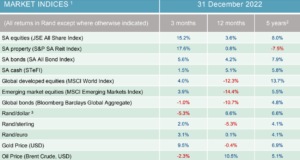Skip to content
Economic and Market Overview – January 2023

December 2022 In Review
-
It was another tumultuous year in markets. For the full year no domestic asset class offered positive real returns for the first time in over two decades. Money market investments (up 5.1%) provided the best return, lagging inflation by only 2%. Local equities gained 3.6% for the year and bonds ended 4.2% higher.
-
Global markets had a far tougher time than South African investments. Global inflation approached 9% for the year while investment markets ended 2022 much lower. Global equities (as measured by the MSCI World Index) lost 18% in US Dollar terms, while global bonds gave up a little over 16%. Emerging market equities shed nearly 20% for the year, which makes the performance of the JSE All Share index (down only 2% in US Dollars) so much more remarkable.
-
In the week before Christmas, the ANC held the first part of their 55th National Conference in Johannesburg. The results of the ANC’s elections for its top 7 national officials reveal much about the party and South Africa currently. In short, while the stability this result implies may well be good for the country in the shorter term, there is a strong underlying weakness and brittleness of the ANC right now. It is clearly badly divided and can give the impression of almost collapsing in some areas.
-
Major central banks ramped up interest rates at the fastest pace and biggest scale in at least two decades in 2022 as policy makers went all-out in the battle to contain surging inflation. Central banks overseeing the 10 most heavily traded currencies, delivered 2 700 basis points of tightening in 54 rate hikes over the past 12 months, Reuters calculations show.
-
On a monthly basis, data showed that seven out of the 10 major central banks lifted rates in December. The U.S. Federal Reserve, the European Central Bank, the Bank of England, the Reserve Bank of Australia, Norway’s Norges Bank, the Bank of Canada, and the Swiss National Bank all raised their benchmarks by a cumulative 300 basis points. This compares to the monthly peak of 550 bps in September, though not all central banks meet monthly.
-
Eskom’s load shedding for the next year will depend on these scenarios:
-
Under their base case, it anticipates almost no load shedding as long as unplanned breakdowns remain below 13 000MW (their total generating capacity is about 45 000MW)
-
If breakdowns exceed 13 000MW and remain below 14 500MW, persistent load shedding will continue, at least at stage 2. Higher stages here are inevitable, however, due to the limitation on the cost and availability of diesel.
-
If breakdowns exceed 14 500MW and move above 16 000MW, high levels of load shedding will be in place almost permanently, as diesel costs will spiral way beyond Eskom’s budget.
-
The share price of Elon Musk’s Tesla dropped almost two thirds during 2022. As much as speculators may want to blame this on the Twitter deal, what’s really happening is that other car manufacturers are rapidly catching up in the electric vehicle market while global economic growth is slowing down. It’s now trading at levels last seen in August 2020.
-
Lionel Messi’s Argentina won the FIFA World Cup, beating the defending champions, France, in a penalty shoot-out at the end of an epic final. This was a crowning moment for Messi’s already illustrious career, and not even 23-year old Frenchman Kylian Mbappe’s hat-trick could stop the Argentinians from taking the cup.

- Source: Factset
- All performance numbers in excess of 12 months are annualised
- A negative number means fewer rands are being paid per US dollar, so it implies a strengthening of the rand.
Page load link


